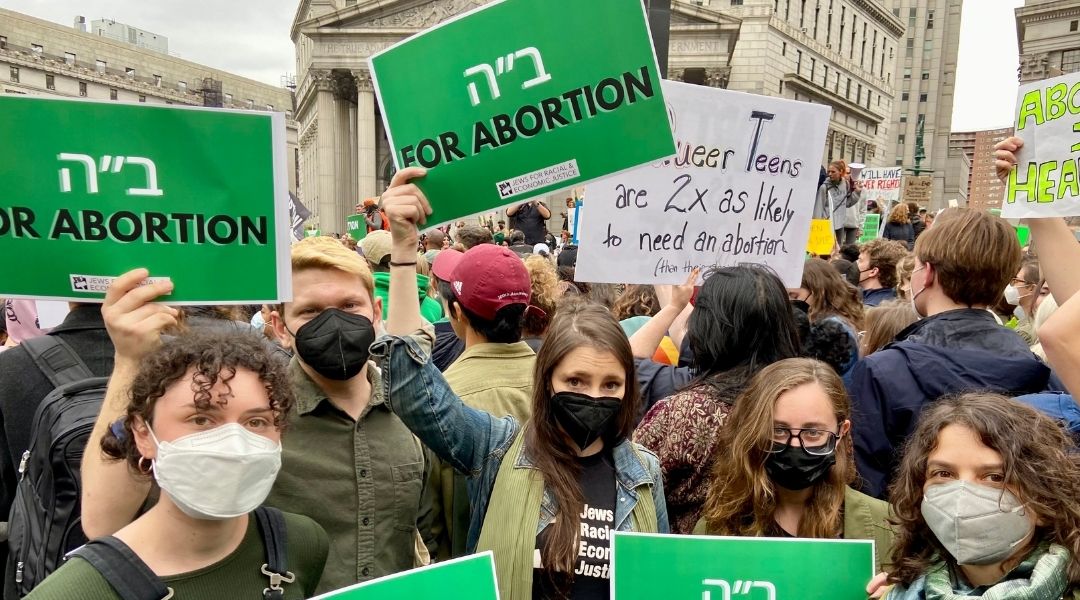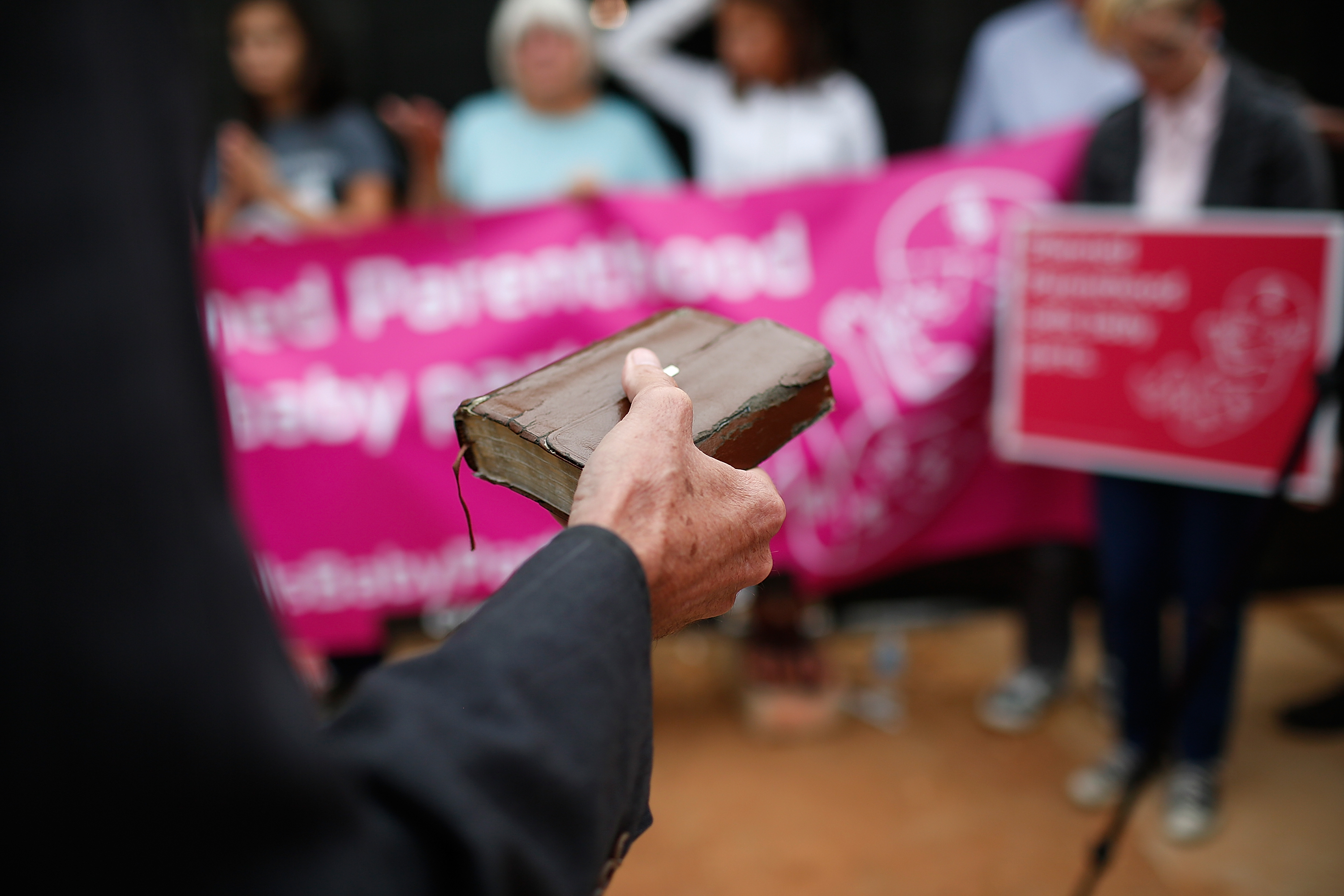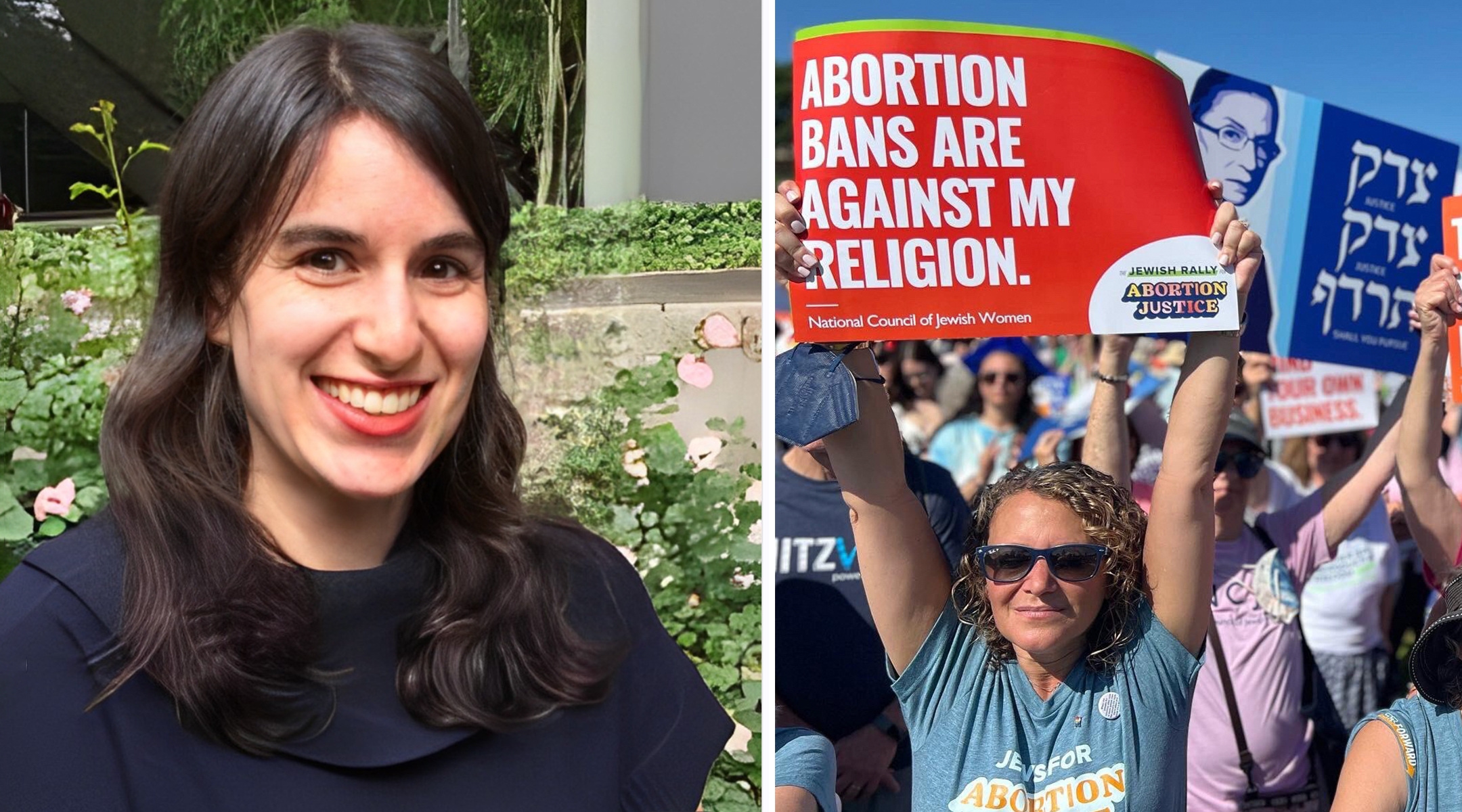(JTA) — The abortion debate is often portrayed as a clash between religious beliefs on the pro-life side and secular or humanist convictions on the pro-choice side. Indeed, lawmakers and activists have often invoked God in enacting state bans on abortion since the Supreme Court, in last year’s Dobbs decision, struck down a woman’s right to terminate her pregnancy.
Some clergy and faith groups, however, including a number of Jews, are pushing back. In efforts to overturn these restrictions, they have been pressing a legal strategy claiming that abortion bans violate their religious liberty. In Kentucky, a case brought by three Jewish women argues that the state’s near-total abortion ban violates their religious beliefs about when life begins and protecting a mother’s life. In Indiana, a suit brought by Hoosier Jews for Choice and four women who represent a variety of faiths demands exemptions from the state’s abortion ban for people whose religions support abortion rights.
In Florida, a synagogue filed a lawsuit saying the state’s abortion restrictions violate the religious freedom rights of Jews.
“Judaism has never defined life beginning at conception,” the Kentucky suit says, adding that “millennia of commentary from Jewish scholars has reaffirmed Judaism’s commitment to reproductive rights.”
Although Orthodox organizations support restrictions that allow abortion only under rare circumstances, most American Jews and their representative organizations back wide abortion access.
To understand the legal strategy behind these state-level religious challenges to abortion bans, JTA spoke Friday with Elizabeth Reiner Platt, the director of the Law, Rights, and Religion Project at Columbia Law School. Last year, the center published “A Religious Right to Abortion: History & Analysis,” a memo intended for lawyers, activists, faith leaders and journalists.
Platt spoke about what Politico recently called “the sleeper legal strategy that could topple abortion bans,” two recent Supreme Court cases on religion and how the conservative court is approaching religion in general.
Our conversation was edited for length and clarity.
Last August you released a report analyzing how religion law might apply in legal challenges to abortion bans. Can you summarize the strategy?
I always like to start by saying that the idea that religious liberty includes a right to make decisions about one’s reproductive health care is not just a legal strategy that folks came up with in response to Dobbs. It is how religious groups themselves have been talking about their understanding of reproductive rights for a very long time. I have a handy list of denominational statements from a range of different traditions, including some Jewish groups, as well as Lutheran, Presbyterian and Unitarian Universalist back from the ’80s and ’90s saying reproductive rights are a religious liberty issue for them and for their congregations.
One of the most valuable things in that report is the case index that shows cases going back from the ’70s, the pre-Roe era, that make this legal claim where people of faith have said, “Our religious beliefs motivate us to help people access reproductive health care.” The report essentially lays out the different kinds of legal arguments to be made for a religious liberty right to provide access or facilitate abortion care. And we’re now seeing that happen and a handful of lawsuits across the country including Kentucky, Florida, Missouri, Indiana and Idaho. Several of those cases include Jewish plaintiffs [including Missouri, where five rabbis from multiple Jewish denominations are among more than a dozen Missouri faith leaders challenging the state’s ban on abortion]. There’s a very interesting lawsuit in Kentucky right now involving three Jewish women who actually focus on their religious obligation to have children using in vitro fertilization. And so their complaint overlays on both the state constitution as well as the state Religious Freedom Restoration Act, and says that they have a religious right to seek IVF care, but also because of their age and other factors they have a higher risk of pregnancy complications, and so they’re including as part of that complaint right to access abortion care in accordance with their religious beliefs.
How does the IVF relate to abortion in this sense? Are they arguing that abortion is similarly included in a full range of gynecological and obstetric care?
Basically, they make the case that they want access to IVF but also that some of the claimants in the past have had really serious fetal anomalies and believe that the religiously motivated decision for them at that time was to seek abortion care.

Members of Jews For Racial and Economic Justice and IfNotNow hold signs that say “Baruch Hashem [Bless God] For Abortion” at a rally at New York City Foley Square, May 2, 2023. (Jacob Henry)
I’ll start by saying they’re kind of two basic ways a claim can be made.There are concrete Free Exercise Clause claims that essentially say, “My religious beliefs motivate me to seek this care to make this decision. And abortion bans therefore stifle my religious practice.” And that kind of claim would typically result not in overturning an abortion ban, but in providing a religious exemption for the claimant. The other way to make a religion claim is to say, “This abortion ban is actually religiously motivated and improperly enshrines one particular religious view into law, and it’s therefore a violation of a federal or state Establishment Clause provision.” And that kind of challenge would, if successful, overturn the law completely for everybody.
There is not a lot of case law on the former. There have been many challenges, but they’ve almost all been dismissed on things like standing or mootness — technical, legal things. The big exception is right now: There is a case being brought by the ACLU of Indiana that relies on that state’s Religious Freedom Restoration Act, which was a very contentious law passed several years ago by then Gov. Mike Pence. That case did, at the trial court level, succeed in granting religious exemption to the claimants [which remains in effect even as the Indiana Supreme Court allowed the state’s total abortion ban to take effect Aug. 1]. That’s the first major decision that we’ve seen post-Dobbs.
Is it fair to say that the same law that ostensibly would have protected conservative religious behavior is being deployed from a progressive standpoint?
That is certainly how it gets framed a lot. But these laws should ideally always be applied neutrally, across the denominational and the political spectrum, and have long been used by people of all different faiths and denominations. I deeply do not think that this is some sort of clever legal tactic. We’re seeing, in the wake of Dobbs, ideas and language that have been promoted by religious groups for many, many, many years.
In the current political climate, do you think courts are inclined to accept the right to abortion as a question of religious liberty?
I think there’s definitely an appetite for these arguments. There was a really interesting lower court decision in Kentucky a while back, when a judge ruled that the state’s abortion ban violated religious liberty — without that argument even having been made by either party, which is extremely unusual. I think [that] really shows that there is an appetite for these claims. It’s important to say that almost all of these claims are being brought in state court. Most litigators are bringing cases that would not end up in the U.S. Supreme Court. I’m not Pollyannaish about the fact that we have very conservative state judiciaries and a lot of these states are very opposed to abortion, but I think the legal claims themselves based on doctrine should be very strong.
An argument I’ve heard in the Jewish community is that because some of the Jewish plaintiffs pressing religious freedom arguments aren’t Orthodox or traditionally observant Jews — in other words, because they do not act according to traditional Jewish law in other aspects of their life — they shouldn’t be making religious claims in this one area of reproductive rights. Do the courts take into consideration the extent of perceived sincerity or consistency of a party’s beliefs and actions when they review these cases?
Courts can absolutely look at religious sincerity, but I also think it’s outrageous to say that “only Orthodox Jews are sincere.” You know the old saw: two Jews, three opinions. What matters is not getting an Orthodox rabbi in the stand to give expert advice on the Talmud. What matters is the plaintiffs’ own understanding of their Judaism and what it looks like in practice. People can be very sincere about how they practice their Judaism without necessarily being glatt kosher or what have you. Courts tend to use a pretty light touch when it comes to sincerity.
Going back to the Establishment Clause, can you explain to me how an entire ethos that seems to be very much based in religious conceptions of when life begins can make it into secular law without running afoul of the Constitution? Some of these abortion bans seem to me to be examples of one denomination’s religious views becoming everyone’s law. How does that pass muster?
The key case on this is Harris v. McRae from the ’80s, which was a case that challenged the federal Hyde Amendment that bans almost all federal funding for abortion. The challengers made that exact claim: that this is based on a particular conception of when life begins and is essentially a religious restriction. And that case lost before the Supreme Court. The court said that just because a law happens to overlap with particular religious beliefs, it doesn’t make it an inherently religious law. And honestly, since then, the Court’s conception of the Establishment Clause has gotten narrower and narrower.

Right to Life advocates pray during a sit-in in front of a Planned Parenthood in Washington, D.C. (Win McNamee/Getty Images)
That does not mean, however, that that’s the end of the story. Again, I’ll say that most of these claims are being brought under state rather than federal provisions. And we’re now seeing state legislators being much more frank and forthright about their religious motivations when passing some of these laws, in a way that can be relevant to new Establishment Clause challenges. So, for example, the Missouri case which is being brought by Americans United for Separation of Church and State and National Women’s Law Center [filed on behalf of 13 clergy members from six faith traditions, saying that the state’s abortion ban establishes one religious view about abortion as the law of the land in violation of the Missouri constitution]. It’s a challenge under the state’s Establishment Clause. And they point to the fact among other things that the law has the words “Almighty God” right in the text of the statute. That is pretty shocking and unusual.
I’d like to shift gears and talk about some of the other religion cases of the last week. The court ruled last week in Groff v. DeJoy that employers had to show a substantial burden before curtailing accommodations for religious employees, who may seek accommodations for the Sabbath, or wearing distinct dress. Groff was a postal worker who argued he shouldn’t have to work on his Sabbath. What did you think about the unanimous ruling?
This is an unusual example of the court taking at least somewhat of a middle path. They could have ruled very explicitly that the needs of coworkers don’t matter and shouldn’t be considered, and thankfully they didn’t. Ultimately, neither side got exactly what it wanted. I mean, Groff did not get his religious exemption yet. The court tweaked the test by which it will be evaluated, and according to my reading of the case, there is ample opportunity for the lower court to look at the new test and say, “Your request was really burdensome on the operation of this very small postal office, and you don’t get [your accommodation].” The jury’s still out on that case and I think we might see a real kind of diversity in how it ends up getting implemented in practice.
In another important ruling on religion and the law, the court ruled that a website designer could decline to provide service to a same-sex couple based on her assertion that she has a religious objection to creating messages that promote a view she doesn’t accept. I was intrigued by your tweet: “The decision in #303Creative today is not a win for religious liberty.” How did you mean that?
We wrote an amicus brief in this case on behalf of a bunch of religious minority organizations and faith-based organizations from a lot of different denominations. The point we made was that if we want to make sure that people can exercise their religion openly in a pluralistic society and without being chilled or in fear that they’re going to get turned away and unable to access services because they’re wearing a hijab or a yarmulke, then we need robust civil rights laws. A return to a segregated marketplace is going to maybe help a few religious believers who happen to own small businesses, but overall it’s going to have a real chilling effect on religious diversity and pluralism in smaller communities. Our point was that civil rights law shouldn’t be seen as being in conflict with religious liberty, but in fact, civil rights law is what has helped religious minorities thrive in the United States. And you know, I mentioned in my tweet that when my parents were kids, the “Jewish Vacation Guide” was still helping families figure out whether they were going to get turned away from hotels and such.
To take a broader view of the Supreme Court for a second, it’s clearly privileging religion in ways not seen in previous courts. The New York Times columnist Linda Greenhouse has written that the conservative supermajority completely identifies with “the movement in the country’s politics to elevate religion over all other elements of civil society.” I’m wondering if you agree with that assessment. And if so, what are its implications? I know that for a lot of our readers, it’s a great thing to elevate religion over other elements of civil society.
I would tweak it, because there are religion claims that don’t succeed. For example, there have been a lot of cases involving the targeting of Muslims, questioning people about their religious beliefs and practices at the border and the surveillance of mosques and religious groups, and very famously the court’s upholding of the Trump Muslim travel ban. In those cases, religious liberty did not win out over other elements. So I agree that the court has sided with particular, primarily conservative, Christian religious liberty claims. But I don’t think that that is going to protect everyone.
To conclude again with abortion: I don’t know if you are familiar with the work of Rutgers professor Michal Raucher, who argues that Jewish movements like hers — she is a Conservative Jew — should be arguing the case for abortion from the perspective of women’s bodily autonomy, and not the more narrow case that Jewish law allows abortions in some limited circumstances. Are religious challenges to abortion bans just sort of the flip side of religious opposition to abortion — they downplay the autonomy of women as individuals by making their decision-making a matter of church or synagogue doctrine?
This is sort of an age-old strategy question. If you look at the pro-life movement, there was a lot of argument between a “chip away over time” strategy or a more absolutist constitutional amendment saying that personhood starts at the moment of conception. We can have shorter term and longer term strategies, and I don’t know that it’s necessary to pick one. Even to the extent some of these lawsuits don’t end up succeeding, there is value in showing the diversity of religious beliefs on reproductive healthcare, because I think conservative Christians have had such a dominant presence over the issue of religion and abortion. There’s been a lot of history lost. I think of things like the Clergy Consultation Service on Abortion, which was a national network of clergy members who helped people access abortion, vetted illegal abortion providers and also helped people access care abroad. And that history has been all but lost. So yes, I think there can be multiple narratives happening at the same time.
JTA has documented Jewish history in real-time for over a century. Keep our journalism strong by joining us in supporting independent, award-winning reporting.







